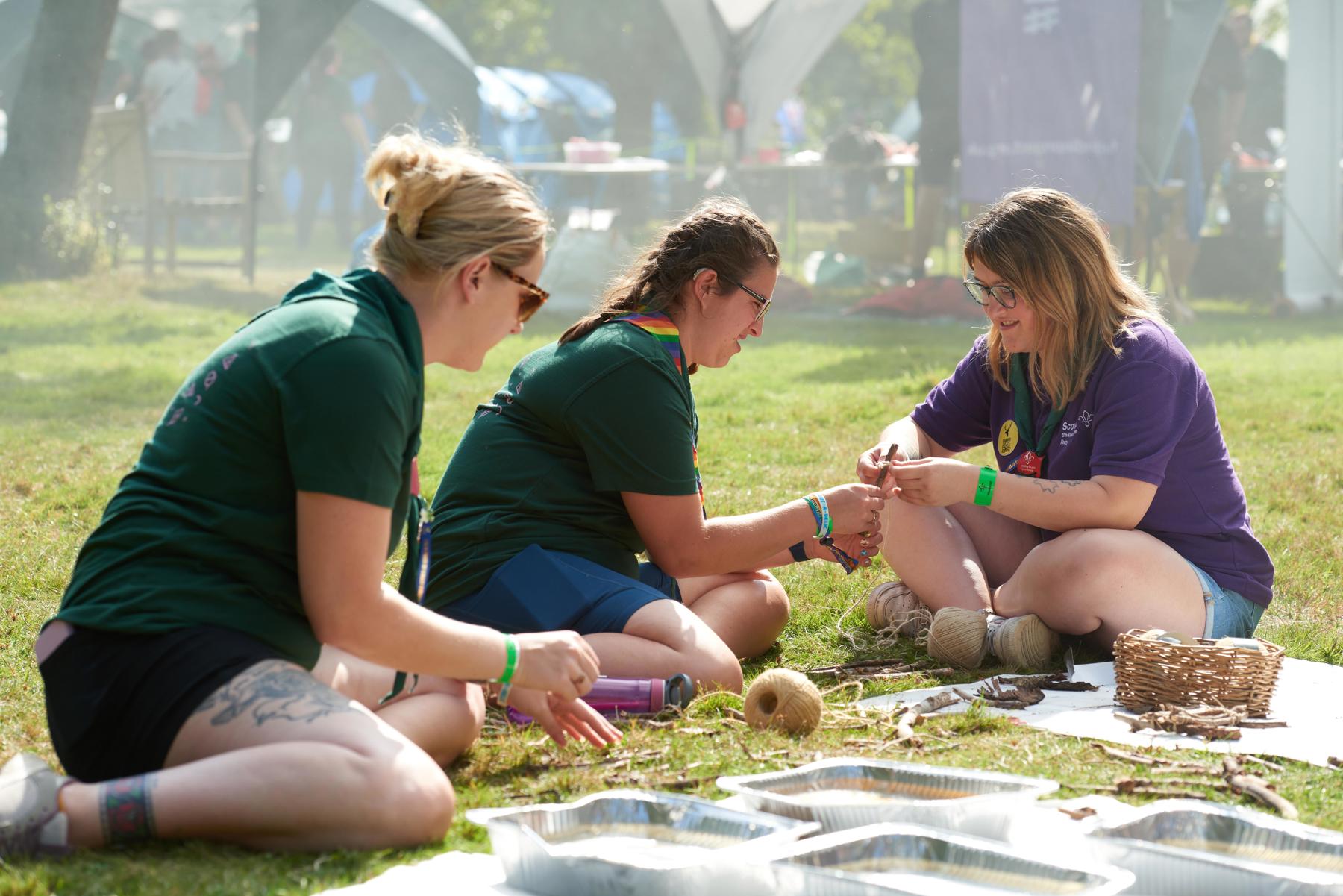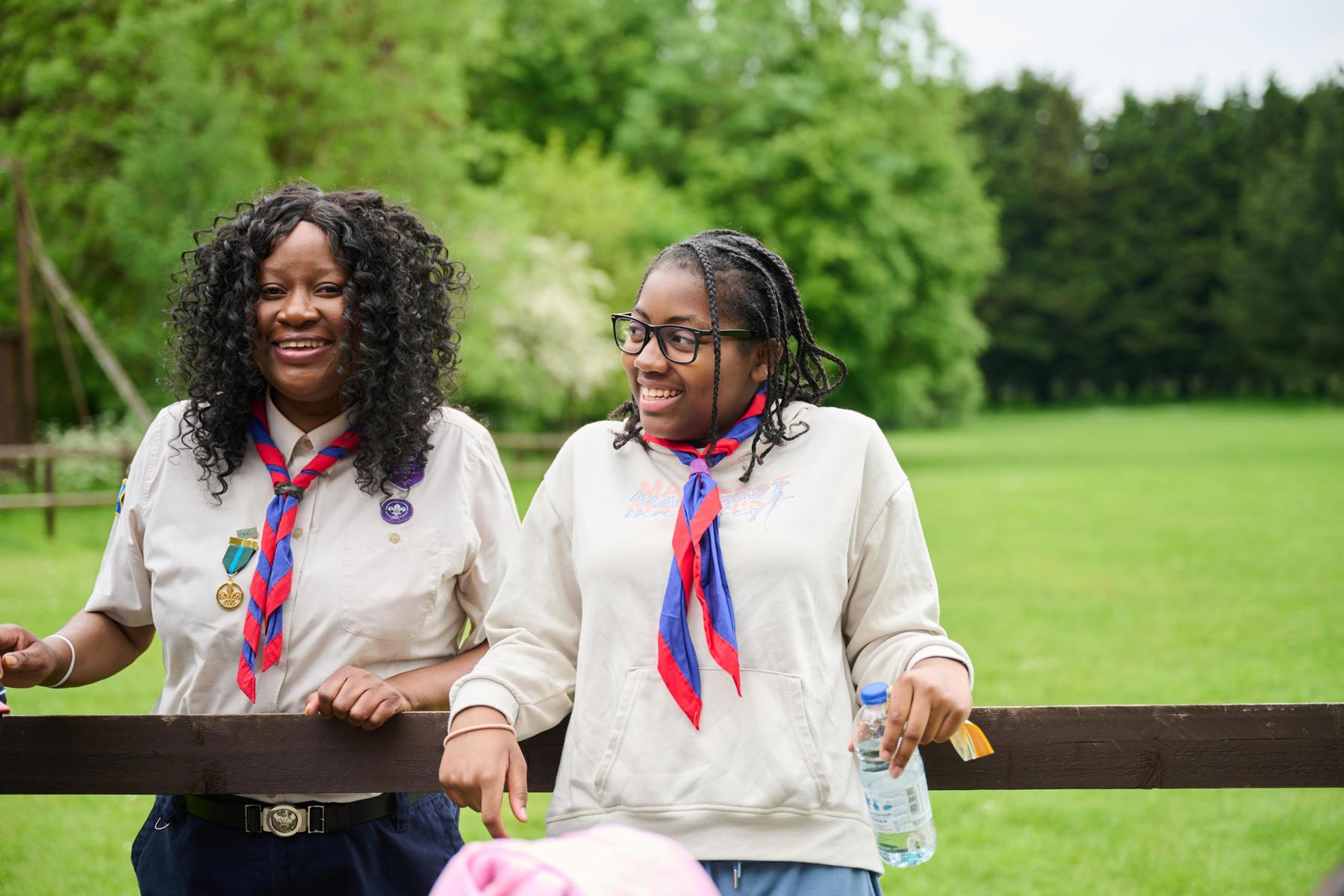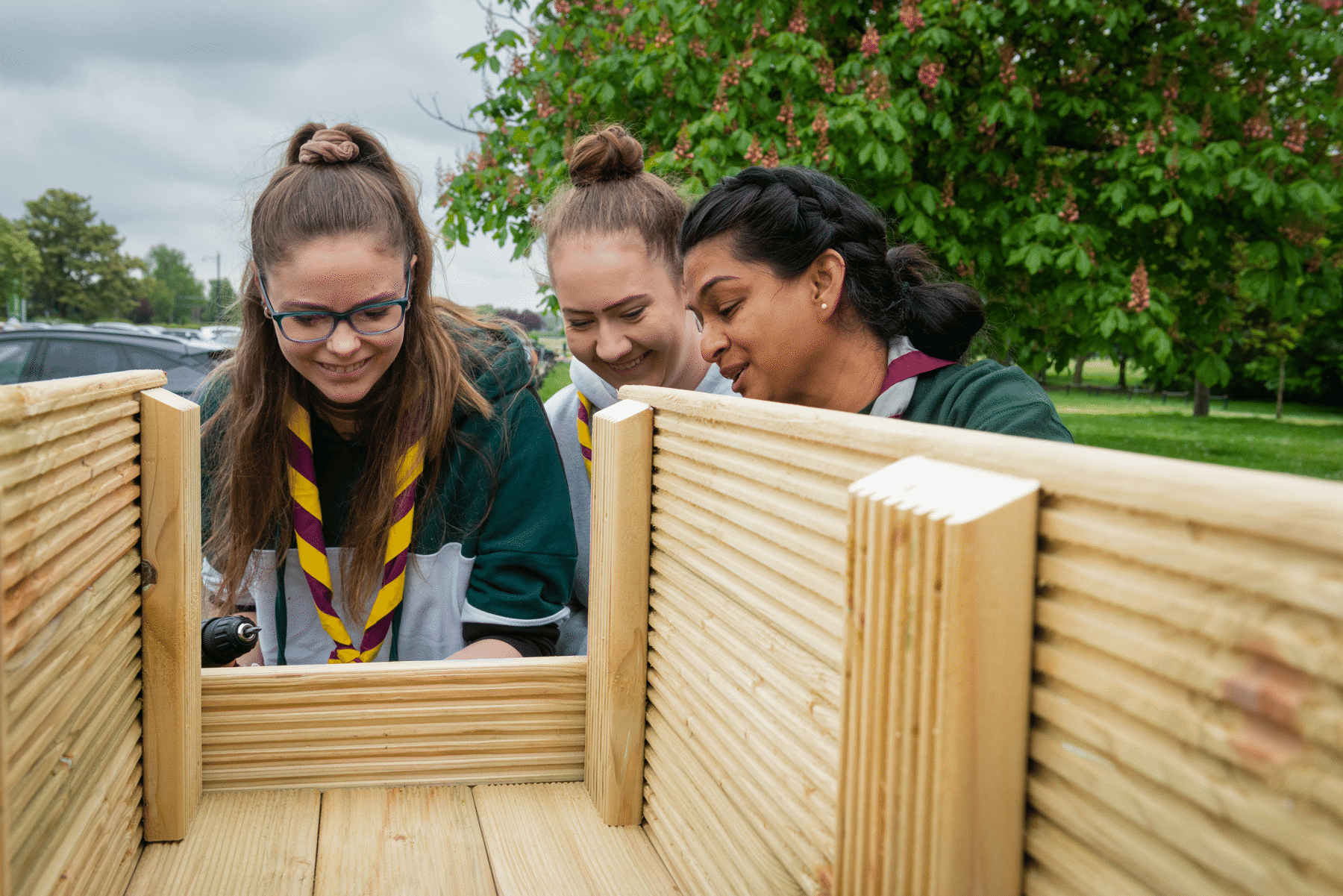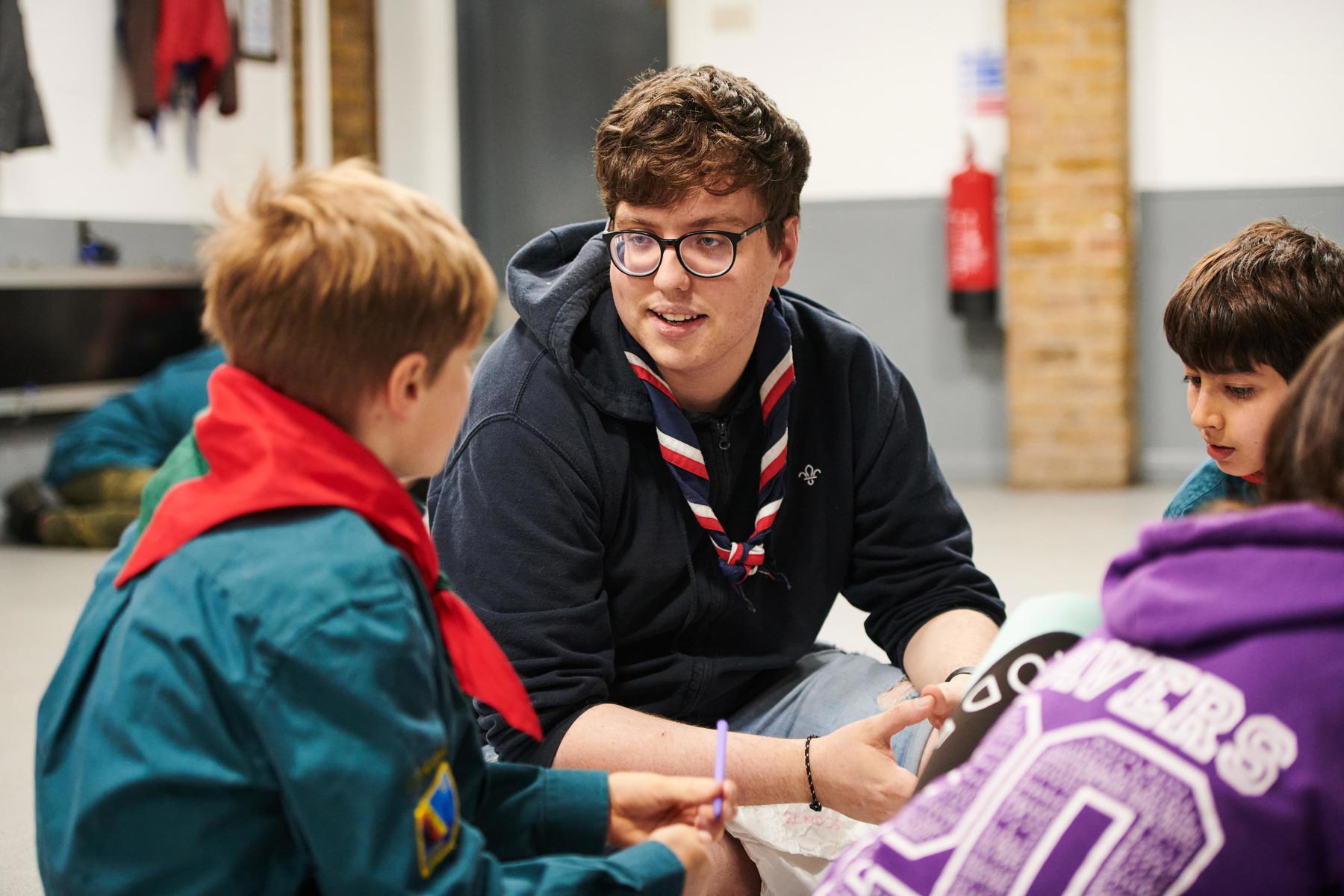Student Recruitment
Quick links
Every September, thousands of young people choose to get a further education, whether at home through further education colleges or away at university.
Many of them are already involved with us. Others might never have heard about what we do. All would benefit greatly from volunteering while studying – making new connections, learning new things and improving their wellbeing.
Check out the ideas below to help spread the word and bring brilliant students into Scouts.

Know where to reach out
Use the Government search website to find universities, colleges and other higher education near you.
What regular opportunities might there to advertise, such as Student Volunteering Week, a Volunteering Fair, or Freshers’ Fair. They could be run by student volunteers or Network members. Make sure there is a way to sign-up or something to take away. You could even include something interactive, such as a ‘guess the number of sweets in the jar’ competition.
Provide an outreach all year round by leaving leaflets, posters or postcards in the student halls, libraries or student unions. Try to update these every now and then so they don’t blend in. Don’t forget to use promotional materials from the Scouts Brand Centre.
Let them know that we work in teams, so it’s easier to be flexible in the time that we give and the tasks that we do.
Don’t forget that students can make great Trustees and provide background support, so advertise for those teams too.
If possible, talk about examples of flexible Scouting and other students.
Some universities have a volunteering department or office as part of the student union. Make contact with them and find out about placing role or task ads.
Students on teaching and childcare courses often need experience of working with children, so this could be good for improving their CV. Many courses actively encourage volunteering.
Student community action groups, individual clubs and societies can also spread the word about the flexible opportunities you have on offer. Ask the local Students’ Union or look on the website for a list of societies.
Would they be happy to put an advert in their prospectus? The advertising of local volunteering opportunities show that they are part of their community.
See if any volunteers work at – or study with – a college, university or other education provider.
Ask if there are District team connections already in place.
Some universities have a Student Scout and Guide Organisation (SSAGO) group, who can put you in touch with potential volunteers.
It’s important to know the barriers that might affect students, such as having public transport access, making sure venues are accessible, and reducing costs. Could you cover expenses or have grants aimed at student or Network volunteers for training days, camps and events?

Have an initial chat
These early conversations really matter. They set the tone when people are trying to work out what sort of organisation we are.
It’s really important to be friendly, conversational, helpful and supportive.
Remember to keep it simple by using plain English, rather than using acronyms or Scout jargons that may confuse people.
Always find out as much as you can about the potential volunteer, such as any previous Scout experience, if they want to work behind the scenes or with young people, or the age group they’d prefer to work with. It means you can find the right team for them.
Students volunteer to enhance their CVs, meet people with shared interests or simply to have fun. They may not be looking for a long-term, regular volunteering arrangement. Try to find all this out to help them get the most out of the experience.
It’s easy to put someone off by overwhelming them with too much too soon, so only tell them what they need to know, like the fact that there will be a team to join. At this stage, they don’t need to know every one of our rules, or every part of our training scheme.
It’s also worth highlighting how great volunteering with the Scouts looks on CVs.
You could promote professional skills that a volunteer can pick up, such as leadership, public speaking and teamwork.
Volunteering with Scouts can help improve career prospects, making individuals stand out when applying for jobs and internships.
Make sure to have a list or map of the local Scout groups that run in student areas, such as near accommodation halls or near the campus, including the days and times they run.
This helps give people an idea of when and where they can volunteer, as well as shows how accessible it is to them to get to.

Follow up
It’s so simple but so important. Make a point of sending a note to thank them for their expression of interest. Talk about the great choice they’ve made and the exciting journey they’re about to go on.
Aim to get back to people who are interested within 48 hours. You could have automatic replies set up to help confirm when you’ll reply.
There’s lots of choice available to people who want to volunteer and we may miss out if we don’t act quickly.
Some people may prefer to be contacted via text or email rather than phone call, so find out what’s best for them.
Make sure there are some meeting places in areas that they can easily walk or use public transport to get to.
You may want to offer them a choice of places close to campus too, so they can go straight from lectures.
Learn what people’s skills and interests are, then help shape tasks around them.
This could include volunteering from home. They may be able to help with photographing events, applying for gift aid, or running social media accounts.
Students are often busy, with lots of different things going on.
Contact them the day before welcome meetings to refresh their memories.

Get them started
You could create a simple, brief checklist of all the things they need to cover and the first bits of training they need, without it being overwhelming. Make sure it tells people about opportunities and meeting times, as well as who to contact locally and nationally, like the safeguarding team.
Take a look at our example welcome pack.
Find ways to connect student volunteers in your area. This could be termly meals or another social event. You could arrange a social event after a training day or direct people to their local SSAGO.
When a student goes to their first few sessions, let them watch first and have some simple jobs planned, like taking the register or getting equipment out.
If your volunteers have names, such as Akela, make sure the new joiner is given one too.
Allow students to have an opportunity to ‘try before you buy’ to find the right team for them. Making sure they’re happy will help them stay longer!
More information on the 4-week challenge can be found here.
Give each new joining volunteer a buddy that can help support them and answer questions.
You could arrange people for them to shadow to help them on their first night and make it feel less intimidating.
Make sure Section Team Leaders regularly communicate with their new volunteer, so everyone knows the plans for the term, their commitments and any upcoming opportunities.

The next steps
Make sure students have opportunities to learn new skills in accessible ways, like online training, hiking or food hygiene.
They could gain experience for their career by managing accounts, designing posters, blogging, creating websites or photographing events, for example.
There are lots of awards and qualifications Network aged students can work towards, including Duke of Edinburgh (DofE), The King’s Scout Award (KSA) and Scouts of the World Award.
Some students may have already started an award and be keen to continue it. You could have an area Facebook group for each award to allow members to connect, ask questions and support each other.
Make sure they’re receiving any local area emails and keep calendars up to date, so they know about any opportunities, like training days, upcoming camps or international adventures. Many students would love the chance to get involved with international travel!
When students join your Section or Group, you could invite other volunteers to one of their sessions to meet them.
You could also include a who’s who on your website or in a welcome pack.
You could have a training day or event run on campus to make it more accessible to students, as they’ll know how to get there. Universities often rent out rooms for local communities to use.
Attending a meeting on your own can be intimidating. Make sure everyone knows someone who is going to a larger training day or event. You could put them in touch with someone who might be able to welcome them or have a student volunteer specific table.

Be flexible
Quite often, owing to the structure of the academic year, long-term roles aren’t suitable for students.
Short-term or one-off projects may be more appealing and introduce students to the idea of making a longer-term commitment to volunteering.
For example, they may be able to help regularly outside exam time or give time and skills rather than volunteering at meetings.
Use their skills to benefit your Sections and let them know they can run activities or complete tasks that suit them. Why not try our task survey, but tailor it for students?
Think about exam periods and when students may be home for the holidays.
Could they continue to help out from home? Are there specific tasks that could be done remotely, like updating badge records or setting up social media posts?
Be understanding if they can’t make the meeting every week. They may have to work late, have training or need to study.
You could have a more flexible pool of on-call volunteers in your area, who may not be able to volunteer regularly, but can help at meetings on an ad-hoc basis or support a residential event.
Set up a flexible volunteer Facebook group, WhatsApp chat or newsletter, so people can ask for or find out about last minute, ad-hoc volunteers or residential volunteer opportunities.
Could someone lead a dance workshop across your area as and when needed, but not commit every week to a specific section?
Set up a skills pools, so members can register what they can offer to help with for all groups in an area. You could try using a Facebook group or WhatsApp group to do this – BUT remember not to share contact details without permission and store data safely.
Make sure to see how your area can adapt training or awards, so everyone can work on them.
They could have virtual check-ins or have work submitted via Dropbox

Retain student volunteers
If volunteering feels more like an event than staying at home, you’re on the right track. It’ll keep people coming and wanting to be involved.
Even though they may volunteer with the younger sections, they may still like to join and be available for summer camps or jamborees.
Make sure everyone understands your agreed commitments to each other. You could find out what people want to achieve and talk through different aspects of their volunteering, so you can delegate tasks to people’s strengths
Don’t forget, it’s okay for their commitment to change – if they say no to something, that’s fine!
If they need to take a break for exams or other reasons, support them with it and encourage them to return when they’re ready.
Think about offering a one-year volunteering award with a certificate and badge. Recognise volunteer contributions and celebrate achievements, both in their Scouting life and personal. There are lots of interesting ways to thank volunteers on these pages.
Could you hold an awards presentation night or volunteer get-together to thank everyone for their hard work?
You should aim to be in regular contact to make sure student volunteers are being properly supported. Always make sure your support is continuous and doesn’t just last for one term, check in often!
You could also send a survey to students to find out how you can develop, promote and improve Scouts for your community – there may have some new ideas and will feel a real part of the team if their thoughts are being noted.
To encourage volunteers to join, you could organise a ‘bring a friend’ night for student volunteers. It may be a normal Scout session, a social event, a larger event with young members or an induction night.
At Scouts, we’re open to all, and it’s important to make everyone feel welcome and comfortable to take part.
Always champion diversity and inclusion, from social media photos to the events you celebrate.
Are there any events, such as Pride, that you could attend that might engage with student communities? How do you show Scouts is a safe space for everyone? And is there any further inclusion and diversity training you could offer?

Support former Explorers
If one of your Explorers leaves for university, think about starting an exchange programme with other counties, districts or Groups to effectively swap volunteers.
Members in your area who are going away to university will likely be returning to the area during their holidays, so it’s important to keep in touch.
An email or newsletter once a term can encourage people to come back to volunteer when they can. Joining the groups or units Facebook pages can be a great way of showing them the fun and acts as a great link.
Students often come home for the holidays or for weekends.
Help run or set up a holiday or weekend Scouts session for members who may only be able to commit outside of term time, such as students or teachers, and promote it in your area.